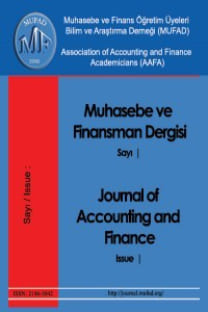Quality of Financial and Accounting Information in Albania as Perceived by The Practicing Accountants
Muhasebe uzmanları ile yapılan bir anketin sonuçlarına göre hazırlanan bu çalışmada yayınlanan finansal tabloların kalite sorunları ele alınmaktadır. Bu çalışma tabloları, hazırlayan ya da kullanan profesyonellerle yapılmıştır ve finans, muhasebe bilgilerindeki kalitenin değerlendirilmesi amacıyla Arnavutluk’ta yapılan ilk çalışmalardan biridir. Bu çalışmaya elli profesyonel katılmıştır. Onların görüşleri analiz edilmiş, çeşitli sonuçlar ve bulgular ortaya çıkmıştır. Genel olarak Arnavut şirketler tarafından hazırlanan mali tablolar “gayri güvenilir” kabul edilir. Bunun nedeni, mali tabloların, Arnavutluk muhasebe çerçevesindeki kanuni düzenlemelere önem verilmeden hazırlanmasıdır. Her günkü uygulamalarında bir çok tutarsızlık gören profesyonellerle görüşülmüştür. Yayınlanan finansal bilgi henüz hazır değildir ve yeni Ulusal Muhasebe Standartları’nın uygulanmasını teşvik edecek ve izlenecek iyi mekanizmalar da yoktur. Görüşülen muhasebeciler, Arnavutluk’un gerekli uzmanlığa ve beşeri sermayeye sahip olmadığından, IFRS ve Ulusal Muhasebe Standartları’nın uygulanmasını, muhasebe eğitimi, mesleki birlikler ve farklı üniversitelerce gerçekleştirilen eğitim çabalarını yetersiz görmektedirler. Tespit edilen sorunlara mali bilgilerin kalitesinin gelişmesine yol açabilecek çeşitli tavsiyelere çalışma boyunca yer verilmiştir.
Anahtar Kelimeler:
Muhasebe bilgisi kalitesi, finansal raporlama, muhasebe standartları.
Based on the results of a survey with accounting professionals this article tackles the issue of the information quality of published financial statements. This is one of the first studies attempting to assess the quality of financial and accounting information in Albania as perceived by those professionals who either prepare the statements or use them. Fifty professionals participated in this study. Their opinions are analyzed and several conclusions and findings have emerged. In general the financial statements prepared by the Albanian companies are regarded “non-reliable” and regardless the recent improvements in the legal and accounting framework in Albania, the professionals interviewed still perceive a lot of inconsistencies in their every day practices; the published financial information is not readily available and there are not good mechanisms in place to monitor and instigate the implementation of the new National Accounting Standards. The interviewed accountants think Albania does not have sufficient expertise and human capital to face the requirement for IFRS and National Accounting Standards implementation, and the accounting education and training efforts exercised by different universities and professional associations seem roughly inadequate. Based onthe problems identified throughout the study we give several recommendations which may lead to improvements in the financial information quality.
- ISSN: 2146-3042
- Yayın Aralığı: Yılda 4 Sayı
- Başlangıç: 2005
- Yayıncı: Muhasebe ve Finansman Öğretim Üyeleri Derneği (MUFAD)
Sayıdaki Diğer Makaleler
Rezarta Shkurti (Perri), M.A. Julian Naqellari
Kıdem Tazminatı Karşılığı Uygulamasının Muhasebe Standardı (IAS-TMS 19) Kapsamında Değerlendirilmesi
Genel Müdürün Aynı Zamanda Yönetim Kurulu Üyesi Olması Firma Performansını Etkiler mi?
Fatma Ulucan Özkul, Gülçin Tapşın
Finansal Riskten Korunma Muhasebesinde Etkinliğin Ölçülmesi
Sürekli Muhasebe Meslek Eğitiminin Önemi ve Bir Değerlendirme
Farklı Ekonomik Yapılarda ve Türkiye’de Bütçeler
Bir Bilgi Sistemi Olarak Muhasebenin Kobi’lerin Yönetim Kararlarına Etkisi: Erzurum Araştırması
